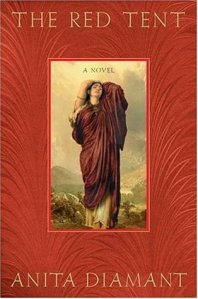Title: The Red Tent
Author: Anita Diamant
Genre: Historical Fiction
Trigger Warnings: Death of children, death in childbirth, menstruation, masturbation, pedophilia, rape mention
Read To: 8%
Back Cover:
Her name is Dinah. In the Bible, her life is only hinted at in a brief and violent detour within the more familiar chapters of the Book of Genesis that are about her father, Jacob, and his dozen sons. Told in Dinah’s voice, this novel reveals the traditions and turmoils of ancient womanhood–the world of the red tent. It begins with the story of her mothers–Leah, Rachel, Zilpah, and Bilhah–the four wives of Jacob. They love Dinah and give her gifts that sustain her through a hard-working youth, a calling to midwifery, and a new home in a foreign land. Dinah’s story reaches out from a remarkable period of early history and creates an intimate connection with the past. Deeply affecting, The Red Tent combines rich storytelling with a valuable achievement in modern fiction: a new view of biblical women’s society.
Review:
This type of book isn’t normally my thing. It came onto my radar via a glowing recommendation from my mother-in-law, whose book recommentations are usually good, and I was intrigued by the idea of exploring women’s society in a biblical setting and expanding the story of Dinah, whose role in the bible was “raped to give her brothers an excuse to murder a whole city.” So I was willing to give it a chance.
In the prologue, Dinah as the narrator explains that the way to know a woman is to know her mother, and then begins telling the story of her mothers, the four wives of Jacob. The book portrayed Leah, Rachel, Zilpah, and Bilhah as all daughters of the same father, even though I thought in the bible Leah and Rachel were the daughters and Zilpah and Bilhah were their servants. But that’s a minor quibble.
It’s heavy on the exposition and descriptions and light on the dialogue and characters doing things, but I didn’t mind that too much. It could have been a conscious choice to have Dinah narrating all these dtails. And personally I found the worship practices for the household gods really interesting. What put me off was how weirdly sexual the book was, considering that Jacob was definitely an adult and the oldest of the four girls was fifteen-ish (and I think the youngest was around eight).
At first, it wasn’t awful. Rachel and Leah were both smitten by Jacob, a handsome older guy, and having been both twelve-ish and fifteen-ish and found someone way too old for me attractive, I can understand that. Jacob was also smitten with the gorgeous Rachel (a little weird considering she hasn’t even had her first period yet, but okay) and seems to admire the strength of Leah. Where I really started to get uncomfortable was when Jacob started to have sexual dreams about all four girls (remember, the youngest is around eight or ten years old right now) and one of the girls saw him masturbating. That’s where I noped out.
It’s very possible it could have gotten better. I hadn’t even gotten to the point where Dinah herself came into the story. And I do feel a little bad about stopping only 8% in. But one of my resolutions for my own reading is to not read books I don’t want to read and not continue reading books I’m not interested in.

